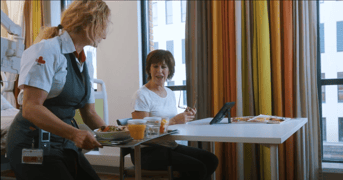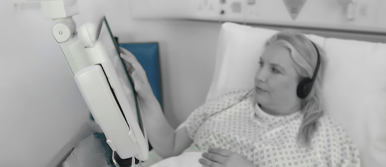SPARK®TSL ROI Calculations Explained
Uncover the transformative potential of meal ordering, virtual ward rounds and translation technology.
7 minute read | 07/09/2023

Savings for Virtual Round Wards
- Monetary: A common challenge facing many consultants in the NHS is the need to travel between sites within a Trust to visit different patients. If consultants could connect with patients at the bedside through video calls, there would be no need to travel and therefore, eliminate the need for the Trust to reimburse staff for fuel costs. Currently, the NHS reimburses 45p per mile.
There are currently 45,800 consultants across 105,0005 beds in the NHS. This means there are 2.3 consultants per bed. The number of miles is calculated from the percentage of consultants that need to travel, the average distance they need to travel between sites and how often they need to make the trip every week. The form in our ROI calculator asks these questions to then calculate how much money the Trust will save on fuel reimbursements. - Environmental: Following the same principle that driving less saves money, it also means less emissions will be released. In the UK, the average CO2 emission per car works out to be 221g per mile. By knowing the number of miles that's usually travelled, we can calculate how much CO2 would be saved.
- Time: Of course driving between sites also takes up valuable time. By removing travel time, staff will be able to see more patients and increase their efficiency. The average consultant costs £39 per hour. To calculate time saving we took the total distance travelled and divided it by 50. This is based of an average 50 miles per hour.
Savings for Bedside Meal Ordering
In this blog we discuss the ROI capabilities of Electronic Meal ordering. Below are some of the key figures broken down.
- Monetary: The typical cost for 3 meals a day in hospital is £8.77. Digital meal ordering has the potential to reduce this cost by 39% in 50% of beds*. Meal ordering saves money in wasted food because patients can order exactly what they will eat. E.g. They order soup but ask that it doesn’t come with the bread roll. They can also order closer to the time meaning they are less likely to change their mind.
- Environmental: Meal ordering is more precise and customisable meaning that patients are more likely to finish their meal. This can save 1.08kg worth of food waste per day in 50% of beds*.
- Time: Staff won’t need to go round with a pen and paper and get people’s orders individually. This could save staff 5 minutes per patient.
*Savings created through meal ordering should effect a minimum of 50% of the hospital beds. The other 50% is attributed to those who can’t order by themselves because of age or the effects of certain treatments.
Savings for Translation Services
In this blog, we discuss the cost savings Trusts can make by switching from traditional translation services, involving onsite staff and telephone services, to technology that can be hosted on SPARK Fusion. In the blog, we provide some big numbers, but where did we get the numbers from? Let me break it down for you by providing several tables and data used to calculate these numbers.
| Patient Inclusivity | |
| Industry Stat - Total amount of population who are LEP (2%) | 1340000 |
| Average hospital number of beds | 500 |
| Average number of patients who are LEP staying at any one time | 10 |
| Average number of nights with patients who are LEP staying per annum | 3650 |
| Staff Efficiency | |
| Industry Stat - Time spent with LEP Patients on Bedside Consultations (45 minutes) | 45 Mins |
| Industry Stat - Time spent with non LEP Patients on Bedside Consultations (30 minutes) | 30 Mins |
| Industry Stat - Average Nurse Salary per Annum - £35K | £35,000 |
| Industry Stat - Average Consultant Salary per Annum - 100K | £100,000 |
| Average bedside consultation time spent per patient per day - Consultant (1 visit) - Non LEP | 30 Mins |
| Average bedside consultation time spent per patient per day - Nurse (2 visits) - Non LEP | 60 Mins |
| Average bedside consultation time spent per patient per day - Consultant (1 visit) - LEP | 45 Mins |
| Average Bedside consultation time spent per patient per day - Nurse (2 visit) - LEP | 90 Mins |
| Average cost per nurse bedside consultations per day - Non LEP | £16.83 |
| Average cost per consultant bedside consultation per day - Non LEP | £24.04 |
| Average cost per nurse bedside consultation - LEP | £25.24 |
| Average cost per consultant bedside consultantion - LEP | £36.06 |
| Cost total bedside consultation per annum - LEP | £223,738 |
| Cost total bedside consultation per annum - Non LEP (3650 patients) | £149,159 |
| SAVINGS - Total cost savings bedside consultations per annum - LEP | £74,579 |
| Reduced Length of Stay | |
| Industry Stat - Average length of stay per patient (6 days) | 6 Days |
| Industry Stat - Average patient cost per night (£400) | £400 |
| Industry Stat - Average additional length of stay for LEP patients ( 6% longer) | 6% |
| Average length of stay per LEP patient | 6.36 Days |
| Average cost per stay by LEP patient | £2,544 |
| Average cost per stay by Non LEP patient | £2,400 |
| Additional cost per LEP patient | £144 |
| SAVINGS - Total cost saving for LEP patients, per annum per average hospital | £525,600 |
| Reduced Re-admission to Hospital | |
| Number of LEP patients per annum | 3650 |
| Industry Stat - Re-admission of LEP more likely (5%) | 5% |
| Industry Stat - Average length of stay (6 days) | 6 |
| Industry Stat - Average patient cost per night (£400) | £400 |
| SAVINGS -Total cost saving per LEP re-admission per annum, based on average stay | £464,280 |
All of the final figures add up to a whopping £1,064,459.
The Patient Engagement Solution To Deliver All These Cost Savings
Let me introduce you to SPARK Fusion. A managed tablet solution that provides an iPad at the bedside. Interested in learning more? Download our handout below or go to our SPARK Fusion product page
About the author
Rebecca O'Donovan
Becky is the Marketing Director at SPARK TSL, of whom she has worked for since 2012. She is responsible for high-level marketing strategy focusing on lead generation and aiding the vision of the business to ensure business growth.
More articles by the author
Related articles
 Healthcare Industry
Healthcare Industry
How The NHS Can Save Money With Electronic Meal Ordering
In 2020, an independent review recommended that every hospital in the UK implement an electronic meal ...
 The SPARK Solution
The SPARK Solution
NHS Patients Shouldn’t Pay for Hospital Entertainment
Why Do Patients Have to Pay for Entertainment? To properly answer this question, we need to go back in time. ...
-1.png?width=386&height=180&name=Stock%20images%20(1024%20%C3%97%20576px)-1.png) Patient Experience
Patient Experience
Everything You Need to Know About Hospedia Bedside Units
Visiting hospitals can be a stressful experience for patients and their families, making it important to ...

